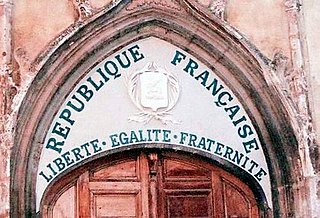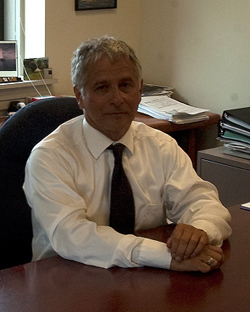
Secular humanism, often simply called humanism, is a philosophy or life stance that embraces human reason, secular ethics, and philosophical naturalism while specifically rejecting religious dogma, supernaturalism, and superstition as the basis of morality and decision making.
Numerous cases involving Jehovah's Witnesses have been heard by Supreme Courts throughout the world. The cases revolve around three main subjects:

Laïcité is the constitutional principle of secularism in France. Article 1 of the French Constitution is commonly interpreted as discouraging religious involvement in government affairs, especially religious influence in the determination of state policies. It also forbids government involvement in religious affairs, and especially prohibits government influence in the determination of religion. Secularism in France does not preclude a right to the free exercise of religion.
Section 2 of the Canadian Charter of Rights and Freedoms ("Charter") is the section of the Constitution of Canada that lists what the Charter calls "fundamental freedoms" theoretically applying to everyone in Canada, regardless of whether they are a Canadian citizen, or an individual or corporation. These freedoms can be held against actions of all levels of government and are enforceable by the courts. The fundamental freedoms are freedom of expression, freedom of religion, freedom of thought, freedom of belief, freedom of peaceful assembly and freedom of association.

Loyola High School is a subsidized private Catholic school for boys in grades 7–11 located in the Loyola District of the Côte-des-Neiges–Notre-Dame-de-Grâce borough in Montreal. It was established in 1896 by the Society of Jesus as part of Loyola College, at the request of the English Catholic community in Montreal. It is named after St. Ignatius of Loyola, who founded the Jesuit Order in 1534.

Freedom of religion in Canada is a constitutionally protected right, allowing believers the freedom to assemble and worship without limitation or interference.
Canadian constitutional law is the area of Canadian law relating to the interpretation and application of the Constitution of Canada by the courts. All laws of Canada, both provincial and federal, must conform to the Constitution and any laws inconsistent with the Constitution have no force or effect.

William Ian Corneil Binnie CC QC is a former puisne justice of the Supreme Court of Canada, serving from January 8, 1998 to October 27, 2011. Of the justices appointed to the Supreme Court in recent years, he is one of the few appointed directly from private practice. On his retirement from the Court, he was described by The Globe and Mail as "arguably the country's premier judge", by La Presse as "probably the most influential judge in Canada of the last decade" and by the Toronto Star as “one of the strongest hands on the court.”

R v Keegstra, [1990] 3 SCR 697 is a freedom of expression decision of the Supreme Court of Canada where the court upheld the Criminal Code provision prohibiting the wilful promotion of hatred against an identifiable group as constitutional under the freedom of expression provision in section 2(b) of the Canadian Charter of Rights and Freedoms. It is a companion case to R v Andrews.

Gosselin v Quebec (AG), 2005 SCC 15, [2005] 1 SCR 238 is a leading case of the Supreme Court of Canada on the constitutional protection of minority language rights under section 23 of the Canadian Charter of Rights and Freedoms. The case was part of a trilogy of minority language rights cases including Solski v Quebec (AG), 2005 SCC 14 and Okwuobi v Lester B Pearson School Board; Casimir v Quebec (AG); Zorrilla v Quebec (AG), 2005 SCC 16.
Section 29 of the Canadian Charter of Rights and Freedoms specifically addresses rights regarding denominational schools and separate schools. Section 29 is not the source of these rights but instead reaffirms the pre-existing special rights belonging to Roman Catholics and Protestants, despite freedom of religion and religious equality under sections 2 and 15 of the Charter. Such rights may include financial support from the provincial governments. In the case Mahe v. Alberta (1990), the Supreme Court of Canada also had to reconcile denominational school rights with minority language educational rights under section 23 of the Charter.

Canadian administrative law is the body of law that addresses the actions and operations of governments and governmental agencies in Canada. That is, the law concerns the manner in which courts can review the decisions of administrative decision makers such as a board, tribunal, commission, agency or Crown minister, when he or she exercises ministerial discretion.
The Mouvement laïque québécois (MLQ) is a non-profit organisation whose goal is to defend and promote freedom of conscience, separation of church and state, and secularisation of public institutions in Quebec. It was founded in 1981, developing broader goals from an association devoted primarily to the secularisation of public school curriculum in Quebec.
Ethics and religious culture is a course taught in all primary and secondary schools in Quebec. It replaces the abolished subject of religious/moral education in these schools and is compulsory in all schools: private and public. The aim of the subject is to develop ethical thinking and dialog skills in response to the changing religious/non-religious diversity of cultural communities in the Province. It also allows for all students to understand Quebec's religious history. The program's twin paramount principles are Recognition of Others and Pursuit of the Common Good. It is also claimed that the course will promote a "culture of dialogue" among students

Iain Tyrrell Benson is a legal philosopher and practising legal consultant. The main focus of his work in relation to law and society has been to examine some of the various meanings that underlie terms of common but confused usage. His work towards an understanding of secular and secularism has been cited by the Supreme Court of Canada and the Constitutional Court of South Africa. He has also given critical study to the terms pluralism, faith, believer, unbeliever, liberalism and accommodation and examined the implications for various legal and non-legal usages.
Freedom of religion is a constitutionally protected right in Canada, allowing believers the freedom to assemble and worship without limitation or interference, but it was not always so.

Joseph James Arvay, was a Canadian lawyer who argued numerous landmark cases involving civil liberties and constitutional rights.

Mouvement laïque québécois v. Saguenay (City), 2015 SCC 16 is a Canadian administrative law case, dealing with the effect of a prayer held at the beginning of a municipal council session on the state's duty of neutrality in relation to freedom of conscience and freedom of religion. The decision upheld an earlier decision by the Quebec Human Rights Tribunal, ordering the Saguenay council to stop recitation of the prayer and rendering the by-law supporting such prayer inoperable, as well as imposing $30,000 in compensatory and punitive damages. The ruling has implications for all levels of government in Canada, and several cities announced changes to drop the use of prayers before municipal meetings.

An Act respecting the laicity of the State tabled and commonly known as Bill 21, is a law passed by the National Assembly of Quebec in 2019 which asserts the policy of state secularism in the Canadian province of Quebec.
The idea of ministerial discretion, when employed in Canadian statute law, means the power of a Crown minister to vary or alter the decisions of his bureaucrats, one of his Committees, or one of his Boards. The idea derives from the laws of the United Kingdom, of which Canada, under the rubric of British North America, once was part. The term needs to be written into the statute, as for example in section 51 of the Canadian Oil and Gas Operations Act:
The Governor in Council may at any time, in his discretion, either on petition of any interested person or of his own motion, vary or rescind any decision or order of the Committee made under this Act, whether the order is made between parties or otherwise and any order that the Governor in Council makes with respect thereto becomes a decision or order of the Committee and, subject to section 52, is binding on the Committee and on all parties.










